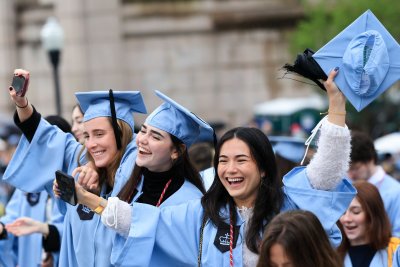
Aug. 28 (UPI) — The Department of Homeland Security plans to introduce a new rule capping the length of stay for international students, among other visa changes, amid the Trump administration’s immigration crackdown.
The new rule will stipulate that foreign students who hold F visas and exchange visitors with J visas can reside in the United States for the duration of their program, but not to exceed four years. Since 1978, foreign F visa holders have been admitted to the United States for an unspecified period, allowing them to reside in the country as long as they are enrolled as full-time students.
The Trump administration says this move will “end foreign student visa abuse.”
“For too long, past administrations have allowed foreign students and other visa holders to remain in the U.S. virtually indefinitely, posing safety risks, costing untold amounts of taxpayer dollars and disadvantaging U.S. citizens,” a DHS spokesperson said in a statement.
“This new proposed rule would end that abuse once and for all by limiting the amount of time certain visa holders are allowed to remain in the U.S., easing the burden on the federal government to properly oversee foreign students and their history.”
Trump ran on a campaign to conduct mass deportations of non-citizens, and since returning to the White House in January has cracked down on immigration.
A focus of this crackdown has been universities, with the State Department earlier this month confirming that 6,000 student visas have been revoked so far this year.
Last week, the State Department announced plans to investigate all 55 million foreigners in the country with visas.
The new rule was swiftly rebuked by international education advocates as unnecessarily creating burdens for foreign students and exchange visitors.
“These changes will only serve to force aspiring students and scholars into a sea of administrative delays at best and, at worst, into unlawful presence status — leaving them vulnerable to punitive actions through no fault of their own,” Fanta Aw, executive direct and CEO of NAFAS: Association of International Educators, said in a statement.
Miriam Feldblum, president and CEO of the President’s Alliance on Higher Education and Immigration, described the rule as “yet another unnecessary and counterproductive action” targeting students and scholars.
“This proposed rule sends a message to talented individuals from around the world that their contributions are not valued in the Unite States,” Feldblum said in a statement.
“This is not only detrimental to international students — it also weakens the ability of U.S. colleges and universities to attract top talent, diminishing our global competitiveness.”
The new measure also sets an initial admission period of up to 240 days for foreign media representatives, with the potential for an extension period of up to another 240 days, but no longer than the lengthen of their temporary activity or assignment.